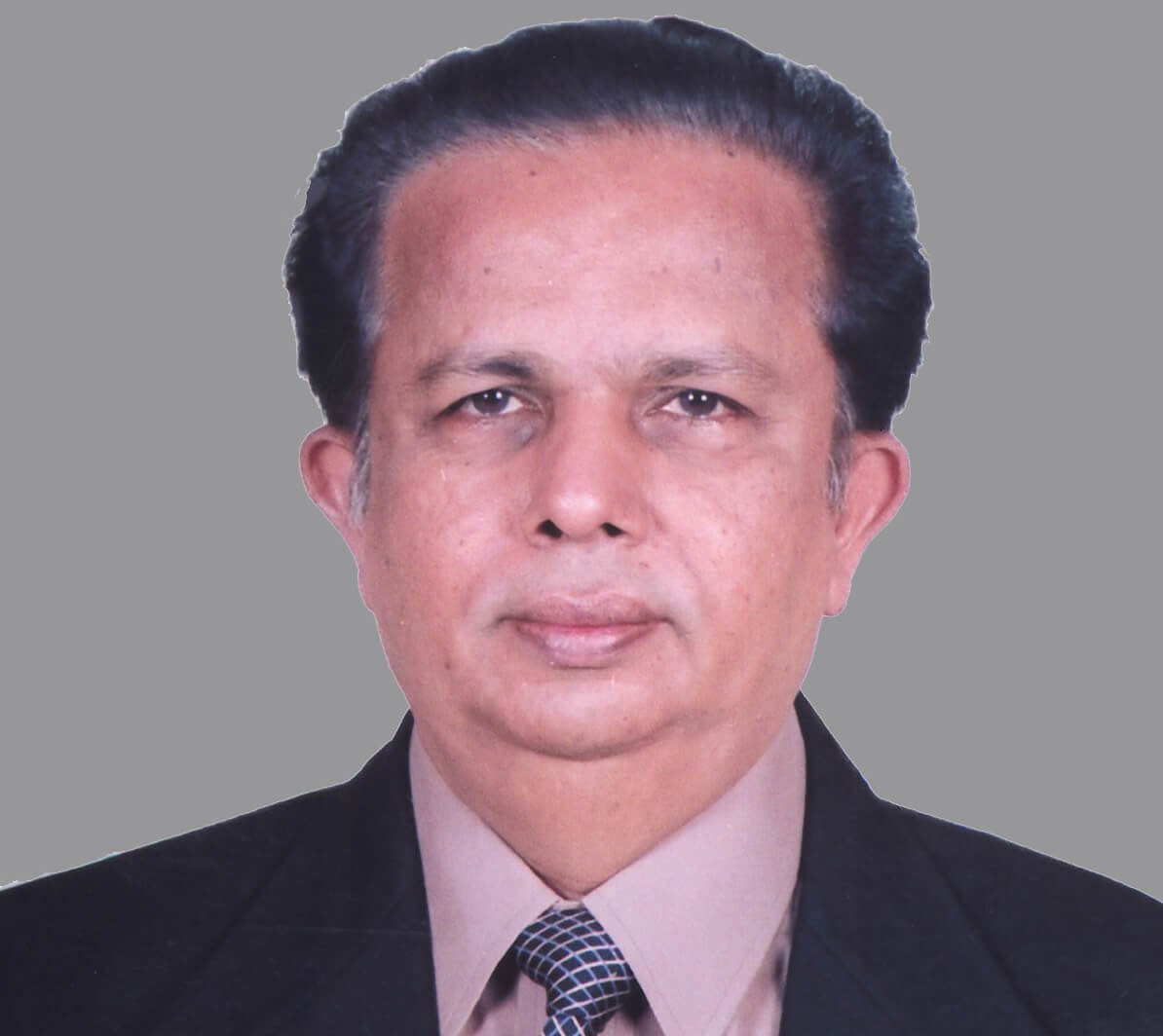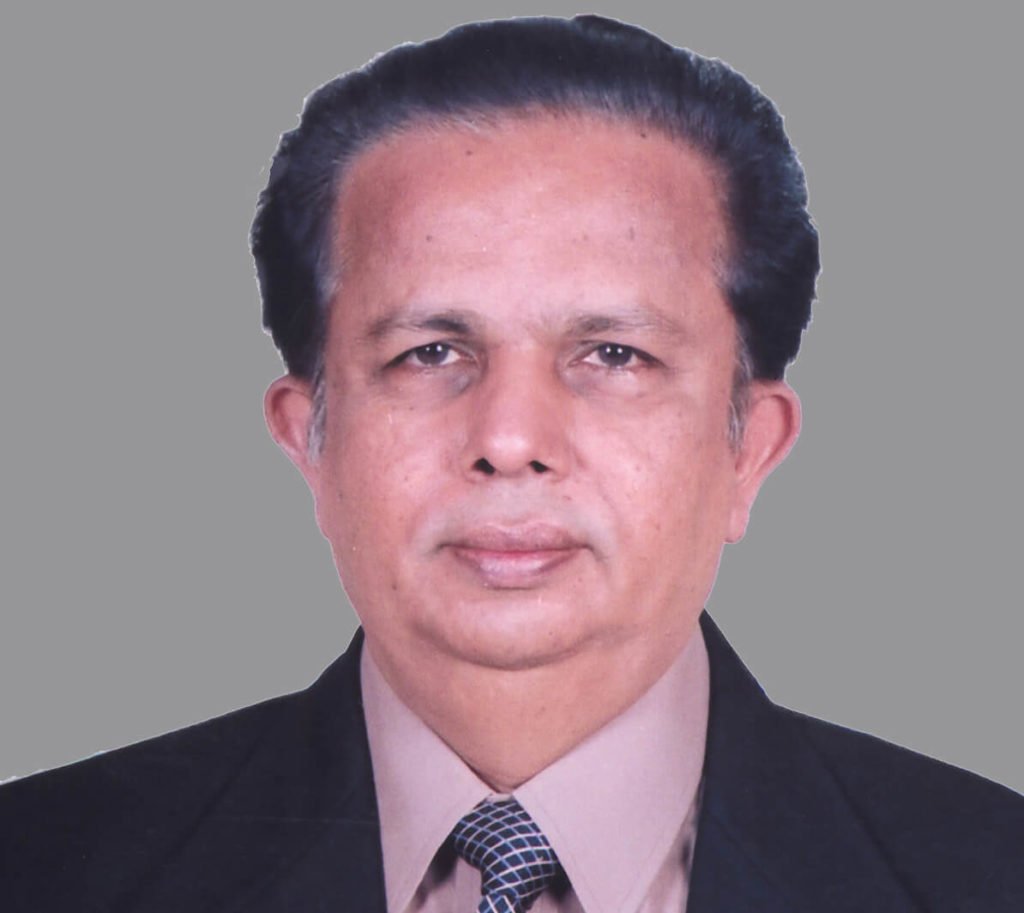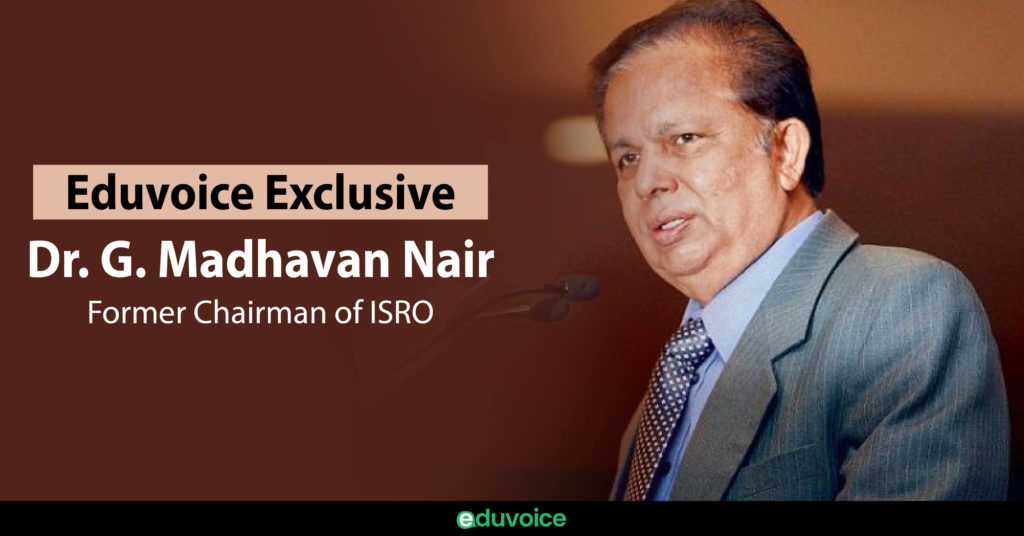Eduvoice exclusive interview

Dr. G. Madhavan Nair
- Former Chairman of Indian Space Research Organisation and Secretary to the Department of Space, Government of India.
- Has also been the Chairman of the Space Commission and Chairman of the Governing Body of the Antrix Corporation, Bangalore.
- Was Chairman of the Board of Governors of the Indian Institute of Technology Patna
“Instead of spoon-feeding these students, they should be guided to acquire knowledge. And how to use this knowledge in society also needs to be introduced.”- Dr. G Madhavan Nair
introduction
The role of a teacher can be traced back from the Vedic era, where teachers were Gurus, and students were Shishyas. This meant much more than lecturing and completing the syllabus.
It is the role of teachers to guide students onto the right career paths, and to help them acquire knowledge in not only theory, but practical too.
I had a humbling opportunity to interview Dr. G. Madhavan Nair, who is the former Chairman of Indian Space Research Organisation and Secretary to the Department of Space, Government of India. He has also been awarded the Padma Vibhushan, the second highest honour in India.
In the interview, he provides a lot of knowledgeable inputs.

Sujata Mehta
Students have changed their attributes toward careers. They are running more to careers that have a high paid salary, like IT. What is your say on this and how can we eradicate this?

Dr. G. Madhavan nair
I think it is part of the globalization and the progress taking place all over the world. People are used to a luxurious type of life which requires a lot of money. So naturally, any youngster will feel that he should make a good living as soon as he comes out of college. So this is a factor that drives students to look for well-paying jobs.
With time, the education system also had a lot of deterioration. We are not able to encourage the young generation to go towards the knowledge acquiring process. Because in most places, students have to write competitive tests and then they get selected for these jobs. So the focus has shifted to writing and passing these tests as soon as possible and getting the job. This is very unfortunate.
SUBSCRIBE TO OUR NEWSLETTER
For latest updates on Exclusive Interviews, News, Articles about Higher Education Industry

Sujata Mehta
These choices of the students are driven by social pressure. So, as per you what are some changes we can implement to transform this perspective of students?

Dr. g. madhavan nair
There is a distortion in the packages being offered for the various jobs. In the developed countries, the pattern is that with a particular qualification, the remuneration also comes in a particular band. It is not widely swinging as it is today.
I remember I took up a situation where there was a lot of exodus from the government to the private sector because the private sector was paying nearly 5 times more than the government. But fortunately, because of the implementation of policies like the pay commission, etc, things have changed.
Especially the research institutes like atomic and space research institutes etc, the entry-level salary today goes to about 50,000-60,000. Whereas IT companies are paying lesser.
Sometimes for the managerial posts, even if the job content is not that challenging, they give exorbitant compensation, not matching with job requirements or efforts required, etc. So this has to change. The private sector as well as the government in the country should come together and decide on a formula.
Depending on if the student is a graduate or a post-graduate, the salary should be fixed within a band.
The distortion has not come in only today, it is a transition that has been taking place over the last three decades. The students have become materialistic.
Second, the teachers aren’t committed to the teaching profession. They simply take it as another means of employment and earning. They spend 9-5 In the colleges and try to finish the syllabus somehow, and they prepare the students for the examination.
They are not exposing the students to challenges of various fields of knowledge, be it is philosophy, psychology, economics, science, etc. The students don’t know what they are learning and why they are learning.
For example, a high school student is asked to learn trigonometry and calculus, but nobody tells him what is the use of it. So this situation has to change.
The teachers will have to expose students to the beauty of the knowledge, where to employ it, how it is going to enrich their quality of life, how it can lead to progress, etc.
Unless the basic foundation of education in lower classes is improved, we cannot a better higher education system. The reform has to start right from the bottom.
“We have to cultivate the habit of inquisitiveness in the minds of the children.”
It shouldn’t be that they are made to study the textbooks from kinder garden onwards.
If you look at the western countries and their system of education, the children are left free. They can explore, experiment, and learn by themselves. This process is continued till the age of 10 or so, and only then are they exposed to higher content in knowledge.
“So instead of spoon-feeding these students, they should be guided to acquire knowledge. And how to use this knowledge in society also needs to be introduced.”
When it comes to higher education, we have lost the base of research. Unless the research culture is brought in, we will not make any impact.
For name’s sake, UGC and other committees have insisted that the teachers should have a Ph.D. But the teachers manage to get a Ph.D. somehow. There are some agencies whom you can pay money and get your thesis ready.
Getting a Ph.D should be based on research and it should lead to knowledge enhancement in the teachers. They in-turn should be able to guide the students to take the path and process of research.
Right from the early classes onwards, the methodology should be such that there should only be an introduction of the topics, and the students should be given projects and homework, whereby they can work themselves and learn. So, if we introduce that culture, only then a change can be made.
We may also require skilled labor. So at the end of education at the school level, or after graduation, skill development should be given good emphasis, because skill is what will get them a job.
Take the IT sector for example. Many of the jobs here have to do with routine work for the costumers. Because of the exchange rate difference, they can offer slightly higher remuneration. But this kind of job does not need an engineering degree or a post-graduate degree to be carried out.
If somebody passes a secondary school and has the basic exposure to the computer operation and how the software can be used etc, it is sufficient for such industries.
You take an engineer who comes out of the higher education system, they are not able to function directly in the industry. So they turn to these easy jobs where they can earn money. But here, we are wasting our talent.
The system of higher education, in IITs, etc, has to go hand in hand with the knowledge acquisition and employability.

Sujata Mehta
As you said, we should implement critical thinking since childhood. And some schools are trying to do so. But if we talk about higher education, how can we do so in our colleges? Also, how can we inculcate practical knowledge such that the students after completing their degree programs are industry ready and are employable?

Dr. g. madhavan nair
I think 50% of the time in colleges has to be spent on acquiring practical knowledge. Students should be guided to carry out some practical work, whether it be some social work, or the political work, maybe in banks when it comes to commerce, etc. They should be allowed to have a hands-on experience.
The second thing is that you have to make sure that the curriculum is made dynamic because technologies and applications are changing rapidly. What was relevant two years ago will not be relevant today. So, the course content has to be changed.
Thirdly, there has to be a flexible system of choice. The course an individual wants, she/he should be able to select based on her/his aptitude, rather than the tight constricting system that exists..
So if these things we improve, maybe we will have a better future generation.

Sujata Mehta
How do you see teaching as a profession in the current scenario? I would like to know more about the profession of teaching from back in your day and today, and how we can improve it and raise its social perception among others. Because professions like doctors and engineers are more socially accepted, but a teacher does not get as much respect. So what measures can we take to eradicate this?

dr. g. madhavan nair

Sujata Mehta
We know that our Vedas are quite rich in knowledge. How can we implement them in our education system? What positive impact will they make if they are incorporated into our curriculums?

dr. g. madhavan nair
I think Vedas are certainly a rich source of information and knowledge, there is no doubt. But we should see in which periods it was applied. We can see 5000 years ago, the kind of demand and the expectation of performance from an individual was different from what it is now. The knowledge was also not as vast as we what we have today.
All the knowledge and wisdom we had in the early years have been compiled into the Vedic literature. It is like an encyclopedia.
But if you take the current knowledge, it is a billion times more than what was at that period. So if you want to convert that into a Vedic form, it will be a Herculean task. Even with the huge computers etc, we are not able to manage all the data that is before us.
The philosophy adopted back then was to teach these things in a consolidated manner. And the Vedic studies at that time were done via oral communication. There were no writing means.
At the same time, I will say that there were many principles about nature and the universe hidden in the Vedic scripts. There are mentions about the origin of the universe and the existence of the galaxies, the stellar system, planets, and so on.
So back then, they were incorporated for use in astrology, not for enhancing scientific research. The same goes for the ayurvedic tradition existing in those days. Again, these were based on practical experience and individual thinking of those rishis.
But today if you look at them, many of those ancient findings haven’t been researched completely. So, it can become a pointer for our future research.
For example, my friend told me there is mention in Vedas that there is water on the moon. But it took us 5,000 years before we could send a satellite there and detect its presence. So if we had considered that pointer, we could have worked differently.
I remember, the samples that NASA had brought here had the presence of water, but they simply ignored it. If only they had exposure to past knowledge from the Vedas, things would have been different.
Certainly, we should make use of them and the Vedic system can be good for our society. But there is no escape from using modern tools, like the computer, internet and so on, to search and learn.
This session I surely can say added several valuable inputs on how we can improve the quality of teaching faculty, as they are responsible for guiding students onto the right path.
For More Such Articles, News Update, Events, and Many More Click Here






